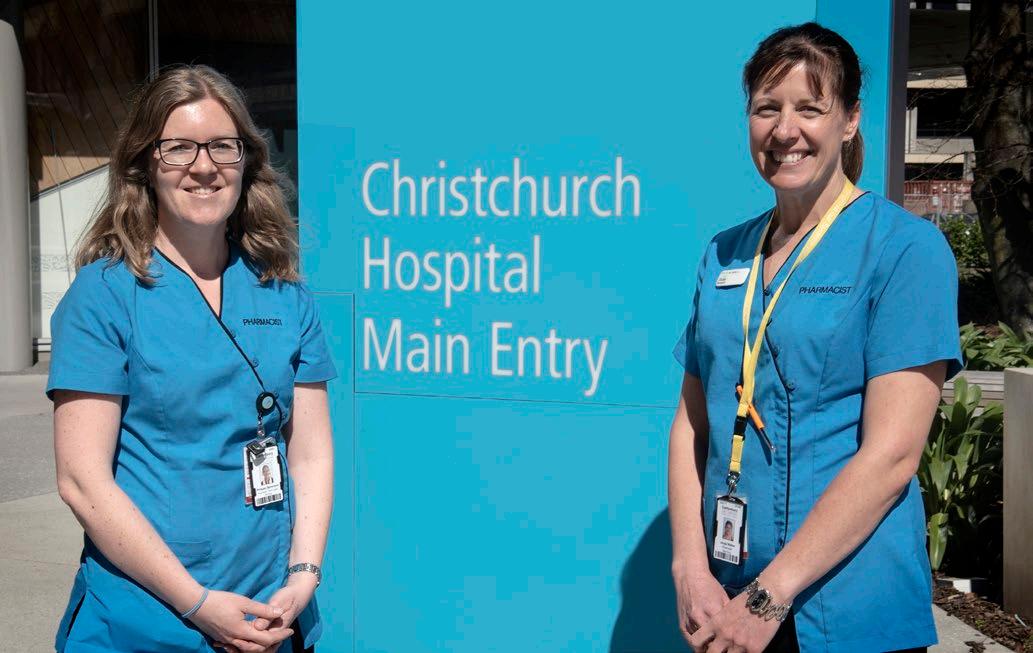
3 minute read
studies in Ashburton
28 September 2020
First students complete rural medical studies in Ashburton
Advertisement
The four medical students who have completed their fifth year of studies in the Rural Medical Immersion Programme in Ashburton and their tutor. From left, Holly Barclay, Jack Sinclair, Janine Lander (tutor), James Jin and Kieren Deng
Ashburton Hospital has hosted its first students to complete studies through the Rural Medical Immersion Programme (RMIP). The RMIP aims to provide an innovative, patient-centred, rural community-based and educationally-sound full-year rural medical programme. It arose through the vision of the late Wakatipu General Practitioner (GP) Pat Farry as a means of encouraging students to pursue careers in rural health and build and strengthen the relationship between rural health professionals and their communities. The students – Sangjun Jin (James), Kieren Deng, Holly Barclay and Jack Sinclair – are all fifth-year students of the Bachelor of Medicine and Bachelor of Surgery (MBChB) programme through the University of Otago. Ashburton’s RMIP started in February this year with doctors Alex Ferberwee and Janine Lander sharing the teaching and coordination of the programme from the Rural Health Academic Centre Ashburton (RHACA). The students have participated in caring for maternity and hospital patients, following them through to Christchurch Hospital where required. They have spent half their time in local general practices and undertaken shifts with the ski doctors at Mt Hutt Medical Centre. They have also experienced regular simulation-based teaching and skills training alongside Ashburton Hospital’s junior doctors in the RHACA simulation suite which opened late last year. James says he chose to participate in the RMIP because he wanted to understand the full picture of the health system and the journey a patient goes through.
“When I was getting trained in Christchurch Hospital last year, I often felt that I was only getting half of the picture. I think that having a better understanding of the entire process will translate into a better understanding of my patients and I can then provide better care.” Kieran says the rural-based training has exposed him to a lot more clinical decision-making experience than may be available in an urban-based programme. “We can become involved in many different domains of care. I think the generalist approach can really benefit people’s health.” Holly, who grew up rurally, says she was excited by the idea of returning to a small-town environment, the independence of the programme, increased learning opportunities and being one of a few students instead of one of many. “Care of patients in a rural environment sometimes requires creativity in how to care for patients and it was interesting to see how this was done.
“Ashburton Hospital is such an asset. All the healthcare workers here are extremely skilled.” Jack says it has been a breath of fresh air to leave the city for a smaller place with less bustle and busyness. 28 September 2020
“RMIP offers something different from the normal med school programme. I feel pretty lucky to be involved – it’s been a hugely rewarding experience.” Janine says the programme has shown the students the benefits of living and practising medicine within a rural community. “A doctor practising in a smaller community is ideally placed to get to know their patients and colleagues better, allowing them to work together to identify what’s important to the patient.” Advance Ashburton Charitable Foundation Chair Mary Ross says the value of having medical students studying across the various health domains within the district cannot be overstated.
“Various studies have clearly demonstrated the benefit of training a health workforce for a rural setting. Students have an opportunity to learn in settings where they experience a wide range of patient conditions, which in turn assists them to excel academically, and there is a greater possibility of them working in a rural area in the future.” RHACA and the RMIP are a collaboration between Canterbury District Health Board, University of Otago, Advance Ashburton Community Foundation and the Mackenzie Charitable Foundation.








